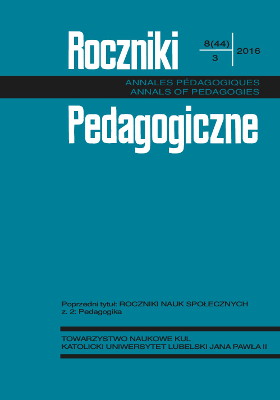Poczucie przywiązania i osamotnienia w relacjach małżeńskich
Attachment and Loneliness in Marital Relationships
Author(s): Monika Kornaszewska-PolakSubject(s): Social Sciences, Sociology, Family and social welfare
Published by: Towarzystwo Naukowe KUL & Katolicki Uniwersytet Lubelski Jana Pawła II
Keywords: marital relationships; attachment; loneliness; marital happiness
Summary/Abstract: The aim of the article is to describe the phenomenon of loneliness appearing in married couples of different length of marriage. The author refer not to this kind of loneliness that is an existential experience, but to a subjective and emotional phenomenon arising in the context of social relations that are inadequate to the needs and expectations of the lonely people. The following variables were taken into account when studying the phenomenon of loneliness: attachment style, the level of marital happiness and quality of relationships in the respondents’ family of origin. The following questionnaires were used: The Attachment Styles Questionnaire (ASQ) by M. Plopa, The Marital Happiness Questionnaire (MHQ) by K. Pospiszyl, The Scale for Measuring Subjective Loneliness (DJGLS) by J. De Jong Gierveld and F. Kamphuis and the author’s own survey examining the relationships in the family of origin. 250 couples of different length of marriage were examined. As a result of the research studies positive relationships were found between loneliness and insecure attachment styles in all subjects and between loneliness and age and length of marriage of surveyed men. It was also the presence of negative relationships between loneliness and marital happiness, secure attachment style and high quality of relationships in the respondents’ family of origin. The quality of relationships in the family of origin consisted of: rewarding relationship with a respondent’s mother and father, a sense of being loved, high assessment of the relationship of parents in childhood, high assessment of respondents’ childhood, parents interest in children learning, parents help in childhood, parents punishment in childhood (understood as a symptom of proper upbringing).
Journal: Roczniki Pedagogiczne
- Issue Year: 8/2016
- Issue No: 3
- Page Range: 23-38
- Page Count: 16
- Language: Polish

